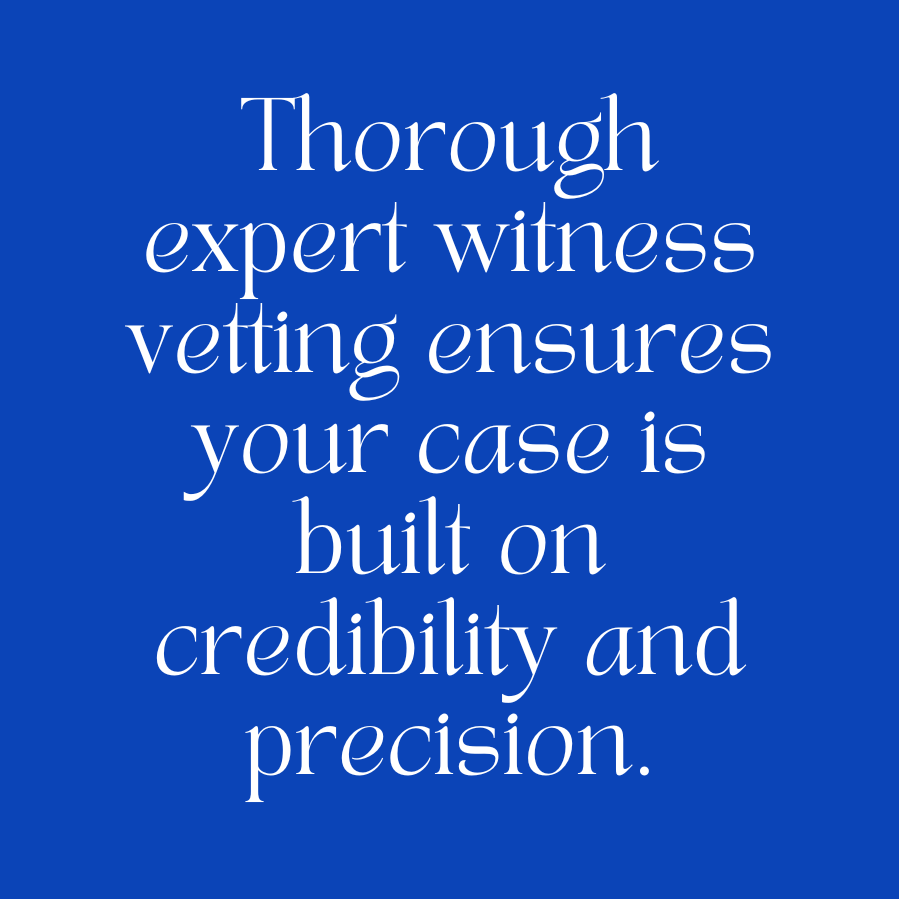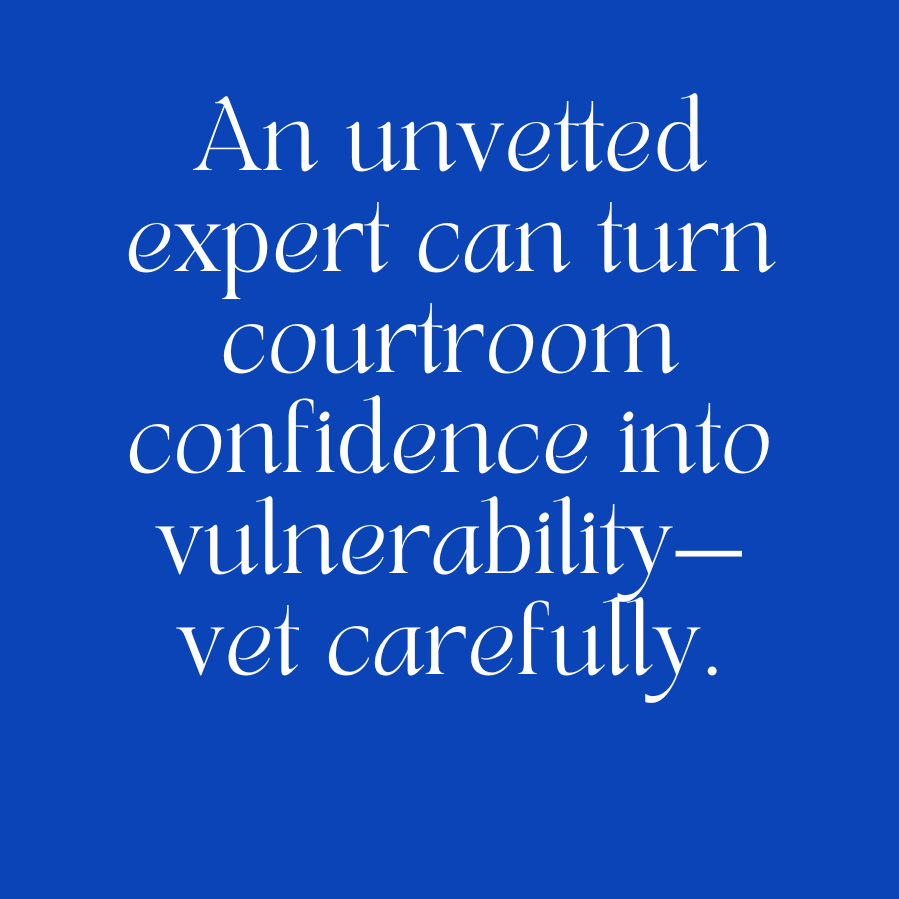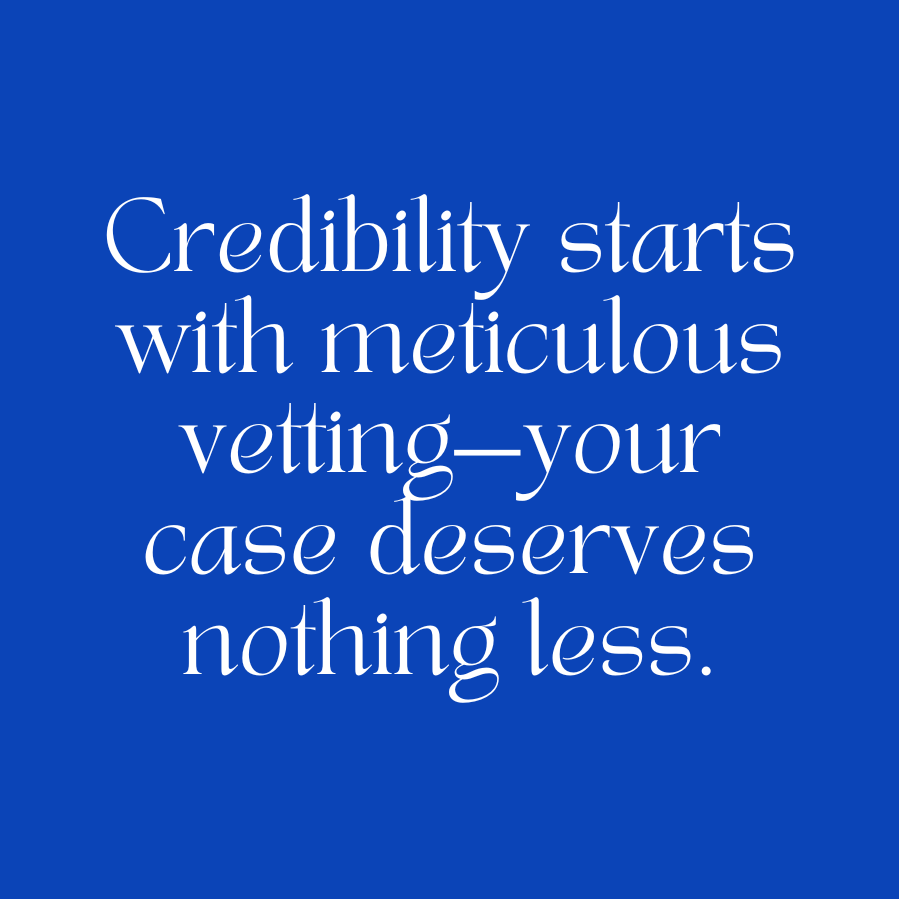The Critical Role of Expert Witness Vetting in Winning Legal Cases
When preparing for litigation, the selection of an expert witness can feel like navigating a high-wire act. One misstep and the credibility of your case—and your client’s confidence—can unravel. Whether the case involves complex financial disputes, medical malpractice, or intellectual property claims, the choice of expert witness often determines how effectively your arguments land in court. This article delves into why expert witness vetting is indispensable for securing favorable case outcomes and how legal professionals can refine this critical process.
The Role of Expert Witnesses in Litigation
Expert witnesses bring specialized knowledge that helps clarify complex issues for the court. Their testimony bridges the gap between intricate subject matter and a judge or jury’s understanding, providing a foundation for critical arguments.
Why Their Testimony Matters
Interpretation of Evidence: Expert witnesses contextualize technical evidence, making it accessible and persuasive.

Validation of Claims: They reinforce your legal arguments with scientifically or technically sound opinions.
Courtroom Credibility: A vetted expert witness enhances your case’s reliability and professionalism, making it more compelling to the jury.
Case Study: The Consequences of Poor Vetting
In a landmark commercial litigation case, the plaintiff’s legal team relied on an engineering expert to establish product defects. However, during cross-examination, the opposing counsel uncovered critical flaws in the expert’s methodology. The expert lacked industry-specific knowledge, which led to the court dismissing key portions of their testimony. As a result, the case was significantly weakened, underscoring the risks of insufficient vetting.
Common Challenges in Vetting Expert Witnesses
1. Time Constraints
Attorneys often face tight deadlines that tempt them to rush through the vetting process. While speed is necessary, cutting corners can lead to selecting an unqualified expert who may crumble under scrutiny.
2. Limited Pool of Experts
Specialized cases often require niche expertise, which can limit the pool of available candidates. In such situations, relying on expert witness networks can expand options and streamline the search process.
3. Cost Considerations
High-quality experts come with premium fees. Balancing budget constraints while ensuring expertise requires strategic planning and prioritization.
4. Assessing Credibility
Verifying an expert’s credentials, reviewing past testimony, and analyzing their methodological rigor are time-intensive but essential for building trust in their opinions.

Key Steps for Effective Expert Witness Vetting
Step 1: Define the Expertise You Need
Begin by identifying the specific knowledge or skills required for your case. For example:
Financial Litigation: Look for experts with experience in economic modeling or damages quantification.
Medical Malpractice: Seek board-certified physicians with a history of clinical practice relevant to the claim.
IP Litigation: Identify professionals with a background in the specific technology or patents at issue.
Step 2: Leverage Expert Witness Networks
Platforms like ExpertConnect Litigation Support offer pre-vetted, courtroom-ready professionals across various fields. These services save time by providing access to a curated list of candidates tailored to your case’s needs.
Step 3: Verify Credentials and Experience
Thoroughly vet potential experts by:
Reviewing their educational background and certifications.
Confirming professional licenses and accreditations.
Assessing their practical experience in the relevant industry or discipline.
Step 4: Examine Past Testimony
Understanding how an expert performs under pressure is crucial. Obtain transcripts of previous depositions or trial testimonies to evaluate:
Consistency in their statements.
Clarity in explaining complex concepts.
Resilience during cross-examination.
Step 5: Evaluate Methodological Rigor
Ensure the expert employs sound and replicable methodologies. Courts often apply strict admissibility standards, such as the Daubert Standard, to evaluate the reliability of expert testimony.
Verify that their approach aligns with these expectations.
Step 6: Conduct Personal Interviews

Before committing, interview the expert to gauge their communication skills and ability to articulate technical concepts in layperson’s terms. This step is critical for ensuring they can connect with a jury or judge.
Step 7: Screen for Conflicts of Interest
Even the perception of bias can discredit an expert’s testimony. Verify that the expert has no prior affiliations with the opposing party or other conflicts that could undermine their objectivity.
The Importance of Communication Skills
An expert witness’s ability to explain complex concepts is as important as their technical expertise. Legal professionals must ensure the expert can:
Simplify technical jargon without losing accuracy.
Engage the jury or judge through clear, confident delivery.
Remain composed under rigorous cross-examination.
The Risks of Skipping Thorough Vetting
Failing to thoroughly vet an expert witness can have significant consequences:
Exclusion of Testimony: Courts may disqualify an expert if their qualifications or methods are deemed inadequate.
Weakened Case Credibility: A poorly chosen expert can cast doubt on your entire argument.
Wasted Resources: Time and money spent on an unsuitable expert could have been directed toward strengthening other aspects of your case.
Benefits of Professional Expert Witness Services
Enlisting expert witness services ensures you avoid common pitfalls while gaining access to top-tier professionals. Advantages include:
Streamlined Search Process: Save time by accessing a pre-vetted pool of candidates.
Credibility Assurance: Receive detailed profiles and verified credentials.
Flexible Options: Match with experts suited to your budget and specific needs.
How ExpertConnect Litigation Support Can Help
At ExpertConnect Litigation Support, we specialize in pairing attorneys with experts who not only possess the right qualifications but also excel in courtroom communication. Our network spans multiple industries, ensuring you find an expert perfectly aligned with your case. Whether you need a financial analyst, medical professional, or technical specialist, our services simplify the vetting process and enhance your chances of success.
Building a Stronger Case with Expert Witness Vetting
In litigation, every detail matters, and expert witness selection is no exception. By prioritizing thorough vetting, attorneys can ensure their expert witness contributes to a persuasive, credible case. From defining the required expertise to leveraging professional support services, these best practices will help you make informed decisions that optimize case outcomes through expert witness vetting.